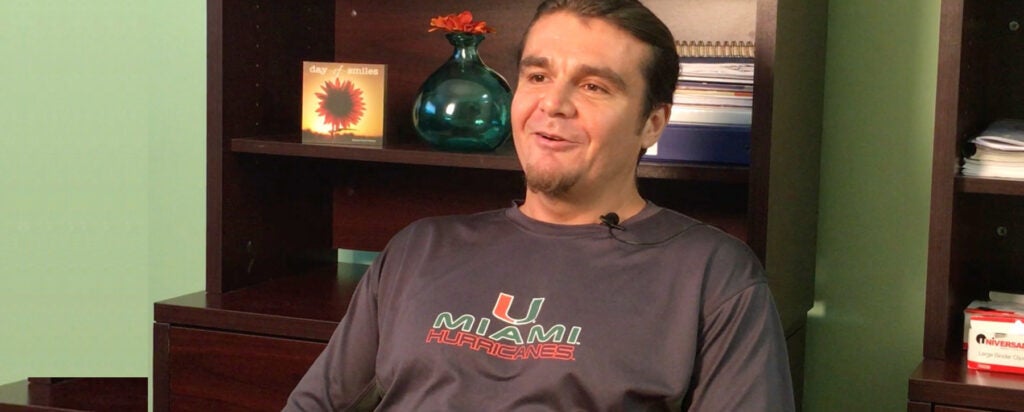

Chris Baglin has lived the classic roller coaster life, the ups and downs fueled by an addiction to drugs. Now he says he has left the ride for good, with the help of St. Luke’s Center, an alcohol and drug treatment facility run by Catholic Charities Miami.
The drama began early. Since his biological parents decided they were not able to raise him, Baglin was adopted at age one by a 50-year-old single mother who had already raised six children. It’s hard to say how the separation from his parents affected Baglin at such an early age, but being wanted and accepted by his foster mother turned a low point into a high one. She passed away in 2016, but Baglin remains grateful to her: “She was real love; she gave me the most love in the world.”
Baglin’s foster mother doted on him and lavished him with gifts of new clothes and video games. But the needs and wants of a toddler are very different from those of a teenager. “When I got to be like 12 or 13,” Baglin said, “I started rebelling, but my mom was so lenient and so nice that it kind of hindered me, because I didn’t have that authority figure. She would ground me, but then I’d be like, ‘I’m so sorry Mom,’ and she would let me off. So it was easy for me to get away with stuff.”
Baglin sees his time of rebellion as the beginning of his descent into drug addiction. Though he never yielded fully to the disease, he soon began a 20-year battle punctuated with stints in jail and attempts at rehab that left him at the proverbial “rock bottom.”
“I was going down a really dark path: snorting fentanyl, snorting heroin,” Baglin said. “I would take stuff from [convenience stores] just to sell it and get drugs. I would do that every day; that was my routine. So I got sick of it. I was so sick of it.”
Then God intervened in his life, according to Baglin. In February 2019, Baglin entered a psych ward at a local hospital and he told the staff that he wanted to hurt himself. He didn’t really want to hurt himself, he said; he just wanted to get a dose of Adderall, which he had been prescribed before and which he thought helped him stay off the street drugs. He did not want to stay in the hospital.
The staff, however, because Baglin mentioned self-harm, told him that they would keep him for a mental evaluation. “When I started withdrawing a little bit,” Baglin said, “I was just like, man, let me just see if they’ll get me to detox or rehab, because I was sick of it. I didn’t want to live like that no more. I want a life.”
Just prior to being released, Baglin heard from a social worker that a bed had become available at St. Luke’s. He was asked if he wanted it, and he said yes: “Now that I look back at it, I’d say it was God who intervened, because it wasn’t my goal at first to get better. But I wanted to, deep down. So I’d say definitely it was a higher power that it worked out like that, going to St. Luke’s, because I probably would go score again and get back into the cycle.”
Baglin entered St. Luke’s in April 2019, and it has made a big difference: “I feel good, optimistic and hopeful,” Baglin said. “I know it’s just going to get better. It’s not going to be easy, I know that, but it’s easier than doing drugs, going to a shelter or staying on the streets.”
Asked what has made the difference at St. Luke’s, Baglin quickly offered a list beginning with the general atmosphere: “It’s the right amount of authority here. When I was at another rehab, it was a lot easier to do things and get away with it, and here it’s not.”
Other characteristics about St. Luke’s that Baglin considers helpful to his recovery include the group meetings. The therapists run the groups well and have good listening skills, according to Baglin. And the peers with whom Baglin attends the meetings have been a pleasant surprise to him: “It’s nice when you’re sitting in a group and you hear people sharing and dissecting the [steps to recovery] and they’re serious about it, because I’m serious about it. It adds to the positive energy.”
Baglin plans to stay at St. Luke’s as long as he can, and when he leaves he will continue with outpatient care. “I’m going to go to meetings even when I’m on the outside,” he said. “When I was in rehab before, I never followed up with that.”
St. Luke’s provides a good environment for people to reach sobriety and to grow in ways they may not have imagined. It seems from his words and actions that Baglin has truly assimilated Catholic Charities’ mission to enhance human life and dignity for himself and his peers. His journey to sobriety has given him a compassionate outlook on people still struggling with addiction. “You should have sympathy for them, not make fun of them in anyway, but thank God you’re not in their shoes. They are human beings too, who have just fallen down from normalcy,” he said.
St. Luke’s proves the maxim that if you help one person change for the better then, through him or her, you help others too.








